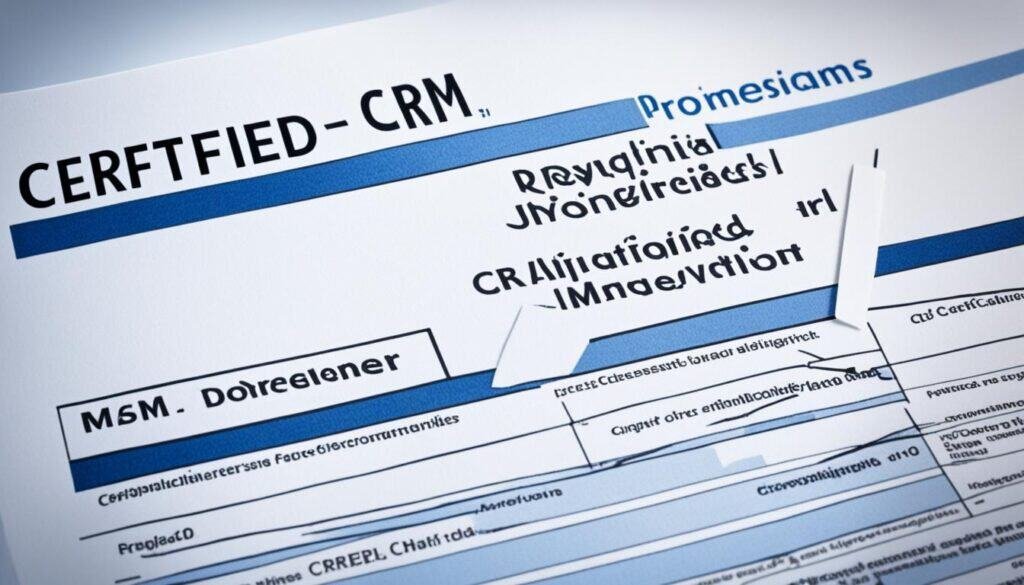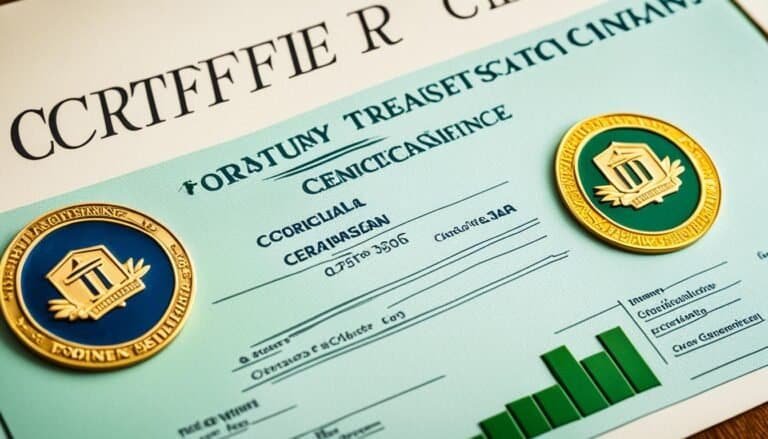Certified Risk Manager (CRM)
Did you know that professionals with a Certified Risk Manager (CRM) designation earn higher salaries on average compared to their counterparts without this prestigious certification?
The CRM program is a game-changer for risk managers, financial and insurance professionals, accountants, and specialists in loss control. It equips individuals with the knowledge and skills to effectively identify, assess, and mitigate risks, making them invaluable assets to organizations.
If you’re looking to advance your career in risk management or enhance your expertise in this field, the CRM designation is the key that unlocks a world of opportunities.
Key Takeaways:
- The CRM designation is held by professionals who have attained expertise in risk management through a rigorous certification process.
- Having a CRM designation enhances credibility within the risk management community and opens doors to higher salary prospects.
- The CRM program offers comprehensive courses covering various aspects of risk management, including risk identification, analysis, control, financing, and practice.
- To earn the CRM designation, individuals must successfully complete all five CRM courses and pass the corresponding exams within a five-year timeframe.
- Once earned, the CRM designation requires individuals to maintain it by completing an annual update, ensuring ongoing professionalism and staying current in the field.
What it means to be a CRM
Being a CRM means that you have a proven understanding of risk management and are part of an international network of dedicated professionals. The CRM designation enhances your credibility within your organization and the risk management community. CRMs have the knowledge and skills to identify and mitigate risks in various areas such as legal, financial, and credit. The CRM designation provides a solid foundation for managing risks effectively.
As a certified risk management professional, you are equipped with the expertise to navigate complex risk scenarios and make informed decisions. The CRM designation signifies your commitment to ongoing professional development and staying at the forefront of risk management practices.
Joining the CRM community means accessing a wealth of industry knowledge, resources, and networking opportunities. You become part of a global network of like-minded professionals who are passionate about risk management. By connecting with other CRMs, you can exchange insights, collaborate on best practices, and learn from each other’s experiences.
“Being a Certified Risk Manager is not just about the designation itself; it’s about being part of a supportive and dynamic risk management community.” – Jane Adams, CRM
Building Credibility and Trust
The CRM designation carries significant weight in the risk management industry. It demonstrates your commitment to professionalism and expertise in managing risks effectively. This designation helps establish your credibility within your organization and enables you to gain the trust of stakeholders, clients, and colleagues.
By achieving the CRM designation, you differentiate yourself as a risk management professional who possesses the necessary knowledge, skills, and experience to tackle complex risk challenges. Employers and clients recognize the value of the CRM designation and seek out certified professionals to lead their risk management efforts.
A Network of Experts
Being part of the CRM community provides you with access to a network of risk management experts from various industries and sectors. This network offers valuable opportunities for collaboration, mentorship, and professional growth.
Whether you are seeking advice on a specific risk management issue or looking to expand your career opportunities, the CRM community is there to support you. Engaging with fellow CRMs through conferences, webinars, and forums allows you to tap into a vast pool of knowledge and experience, enriching your own understanding of risk management.
Continuous Learning and Development
The field of risk management is constantly evolving, with new challenges and emerging best practices. As a CRM, you are committed to ongoing learning and staying ahead of industry trends. Through continuing education and professional development, you deepen your expertise and ensure that you remain a trusted resource in the ever-changing landscape of risk management.
By actively participating in CRM courses, seminars, and workshops, you stay informed of the latest risk management strategies and techniques. This continuous learning journey allows you to adapt to new risks, regulations, and technologies, enabling you to provide innovative and effective risk management solutions.
| Benefits of Being a CRM |
|---|
| Enhanced credibility within your organization and the risk management community |
| Access to a global network of risk management professionals |
| Opportunities for collaboration, mentorship, and professional growth |
| Achievement of a recognized industry designation |
| Ongoing learning and staying at the forefront of risk management practices |
CRM Courses
The CRM program offers a comprehensive curriculum consisting of five courses, each focusing on different aspects of risk management. These courses are designed to equip professionals with the necessary skills and knowledge to effectively identify, analyze, control, and finance risks, as well as implement risk management practices in various organizational settings.
Course Offerings:
| Course Name | Description |
|---|---|
| Principles of Risk Management | Explores the foundational concepts and principles of risk management, covering topics such as risk identification, assessment, and mitigation strategies. Emphasis is placed on developing a holistic understanding of the risk management process. |
| Analysis of Risk | Delves into advanced techniques and methodologies for assessing and analyzing risks in diverse operational contexts. This course focuses on quantitative and qualitative risk analysis methods, risk modeling, and scenario planning. |
| Control of Risk | Examines strategies and best practices for implementing risk control measures and developing risk control frameworks. Participants learn how to design and monitor risk control systems, establish risk controls, and mitigate potential vulnerabilities. |
| Financing of Risk | Explores various risk financing methods, including insurance, self-insurance, and alternative risk transfer solutions. The course covers concepts such as risk retention, risk pooling, and financial instruments used in risk financing. |
| Practice of Risk Management | Focuses on the practical application of risk management principles and techniques in real-world scenarios. Participants develop the skills needed to make informed risk management decisions, develop risk management plans, and effectively communicate risk-related information to stakeholders. |
Completing all five courses and successfully passing the corresponding exams is a requirement to earn the esteemed CRM designation. These courses collectively provide a comprehensive foundation for individuals aspiring to excel in the field of risk management, equipping them with the necessary expertise and competencies to navigate complex risk landscapes effectively.
Course Schedule
Planning your CRM courses is essential to maximize your learning experience. The CRM program offers flexible options for course schedules, ensuring accessibility for professionals with diverse commitments. Below, you will find information on the duration of the courses, learning options, and the availability of instructor-led online and in-person classroom formats.
Course Duration
The CRM courses are typically two days of intensive instruction followed by an optional 2.5-hour exam. This format allows you to immerse yourself in the content and gain a comprehensive understanding of the key concepts and techniques in risk management. The exam provides an opportunity to assess your knowledge and apply what you have learned.
Learning Options
The CRM program understands the importance of providing flexibility in learning options to accommodate the diverse needs of professionals. Whether you prefer the convenience of online learning or the interactive experience of a classroom setting, there are options available to suit your preferences.
For those who prefer the convenience of online learning, the CRM courses offer instructor-led online sessions. These sessions provide real-time interaction with instructors and fellow participants, allowing for collaborative learning and engagement. The online format provides the flexibility to learn at your own pace while still benefiting from the guidance and expertise of experienced instructors.
If you thrive in a traditional classroom environment, in-person classroom courses are also conducted in major cities throughout the U.S. and Puerto Rico. These interactive sessions offer a focused and immersive learning experience, with opportunities for networking and knowledge sharing with other professionals in the field.
Instructor-led Online Schedule
Below is a sample schedule of the CRM courses offered in an instructor-led online format:
| Course | Date |
|---|---|
| Principles of Risk Management | June 15-16, 2024 |
| Analysis of Risk | July 20-21, 2024 |
| Control of Risk | August 17-18, 2024 |
| Financing of Risk | September 14-15, 2024 |
| Practice of Risk Management | October 19-20, 2024 |
Please note that the schedule provided above is subject to change. It is recommended to visit the CRM program’s official website for the most up-to-date course schedule.
In-person Classroom Schedule
For professionals who prefer in-person classroom courses, there are over 300 courses conducted on-site each year in major cities throughout the U.S. and Puerto Rico. These courses follow a similar schedule as the instructor-led online format. To provide greater accessibility, organizations can also request on-site courses to be brought to their corporate or agency locations for team training purposes.
As you plan your CRM course journey, consider your learning style, availability, and the location that suits you best. Whether you choose the convenience of online learning or the interactive experience of in-person classroom courses, the CRM program offers a variety of options to support your professional growth in risk management.
Designation Requirements
To earn the CRM designation, individuals must successfully complete all five CRM courses and pass the corresponding exams within a five-year timeframe. This demonstrates a comprehensive understanding of risk management principles and practices.
The National Alliance does not charge additional fees for taking the exams, making it accessible for aspiring CRMs. The CRM courses cover essential topics and provide the knowledge and skills required to navigate the complexities of risk management successfully.
Below is an overview of the five CRM courses:
| Course | Description |
|---|---|
| Principles of Risk Management | An introduction to risk management concepts, frameworks, and processes. |
| Analysis of Risk | Explores techniques for identifying and analyzing potential risks. |
| Control of Risk | Covers strategies and methods for mitigating and managing risks. |
| Financing of Risk | Examines different approaches to financing risks, including insurance and alternative risk transfer methods. |
| Practice of Risk Management | Focuses on the practical application of risk management principles in real-world scenarios. |
Completing these courses and passing the exams not only demonstrates competence in risk management but also paves the way for obtaining the prestigious CRM designation. It is a testament to the dedication and expertise of individuals in the field.

Becoming a Certified Risk Manager opens up a world of opportunities within the risk management industry. The designation signifies professionalism, expertise, and a commitment to ongoing learning and growth.
Benefits of CRM Designation
The CRM designation offers numerous advantages for individuals in the field of risk management, providing them with valuable expertise and international recognition. By earning the CRM designation, professionals can gain:
- Risk Management Expertise: The CRM designation equips individuals with comprehensive knowledge and skills in risk management. Through the CRM program, professionals develop a deep understanding of risk identification, analysis, control, financing, and practice. This expertise enables them to effectively assess and mitigate risks in various domains.
- Professional Advantage: Holding the CRM designation enhances credibility with organizations and the risk management community. Employers recognize the value of a CRM designation, as it signifies a commitment to ongoing education and staying up to date with industry best practices. Having the CRM designation can provide a competitive edge in the job market and open doors to career advancement opportunities.
- International Recognition: The CRM designation is internationally recognized and respected. CRMs become part of a global network of esteemed risk management professionals, allowing for valuable connections and collaborations with peers from around the world. This international recognition enhances professional reputation and credibility on a global scale.
By acquiring the CRM designation, individuals demonstrate their dedication to ongoing professionalism, continuous learning, and the ability to handle complex risk management situations with confidence.
Testimonial:
“The CRM designation has been instrumental in advancing my career in risk management. It has provided me with the necessary expertise and credibility to excel in this field. The international recognition and networking opportunities have been invaluable. I highly recommend pursuing the CRM designation to anyone seeking professional growth and recognition in risk management.”
– Jane Thompson, CRM
| Benefits | Description |
|---|---|
| Risk Management Expertise | The CRM designation equips professionals with comprehensive knowledge and skills in risk management, enabling them to assess and mitigate risks effectively. |
| Professional Advantage | Holding the CRM designation enhances credibility, providing a competitive edge in the job market and opening opportunities for career advancement. |
| International Recognition | The CRM designation is globally recognized, allowing professionals to become part of an esteemed network of risk management experts. |
Comparison with Other Certifications
When it comes to risk management certifications, the CRM certification is just one of several options available. Other notable certifications in the field include the Associate in Risk Management – Public Entity (ARMP), Certified Risk Management Professional (CRMP), and Professional Risk Manager (PRM) certifications.
Each certification has its own unique requirements and focuses on specific areas of risk management. Understanding the differences between these certifications is crucial in selecting the one that aligns best with your career goals and industry specialization.
| Certification | Requirements | Focus Areas |
|---|---|---|
| CRM Certification | Successful completion of all five CRM courses and passing corresponding exams within five years of the first CRM exam | Comprehensive coverage of risk management principles and practices |
| ARMP Certification | Successful completion of courses specifically tailored to risk management in public entities | Focusing on risk management within the public sector, including government agencies and municipalities |
| CRMP Certification | Meeting certain academic and professional experience requirements, adhering to the CRMP Code of Conduct, and passing the CRMP exam | Demonstrating expertise in risk management across various domains and industries |
| PRM Certification | Completing a comprehensive program of study and passing a series of exams | Specializing in financial risk management, including market, credit, and operational risks |
It is essential to thoroughly research and consider each certification’s requirements, focus areas, and industry recognition before making a decision. The right certification can significantly enhance your professional credibility and open doors to new opportunities in the dynamic field of risk management.
Maintaining the CRM Designation
Once individuals earn the CRM designation, they are required to maintain it by completing an annual update. This ensures that CRMs stay current with the evolving field of risk management and continue to enhance their knowledge and skills.
The annual update can be achieved through various options, including attending seminars or completing specific courses. These opportunities for continuing education allow CRMs to deepen their understanding of emerging risk management trends, explore new strategies for risk mitigation, and stay informed about regulatory changes.
Continuing education is crucial for CRMs to uphold their professional competence and remain valuable contributors to their organizations and the risk management community. By actively seeking out opportunities for ongoing learning, CRMs demonstrate their commitment to excellence and their dedication to continuous professional development.
Emeritus Status and Tenured Status
In recognition of their years of service and contributions to the field of risk management, retired CRMs have the option to apply for special statuses: Emeritus status and Tenured status.
Emeritus status is granted to retired CRMs who have maintained their designation for at least ten years. This honorary status recognizes their significant achievements and contributions to the profession. Emeritus CRMs are given continued access to the CRM community and its resources, allowing them to stay connected with industry peers and continue their involvement in the risk management field.
Tenured status is available to retired CRMs who have held their CRM designation for at least twenty years. Tenured CRMs receive lifelong recognition for their long-standing commitment to excellence in risk management. This status provides special benefits and privileges, including access to exclusive events and resources, further solidifying their esteemed position within the risk management community.
Table 8: Comparison of CRM Designation and Special Statuses
| Designation/Status | Requirements | Benefits |
|---|---|---|
| CRM Designation | Completion of all five CRM courses and passing the corresponding exams within five years of the first CRM exam |
|
| Emeritus Status | Maintaining the CRM designation for at least ten years as a retired CRM |
|
| Tenured Status | Maintaining the CRM designation for at least twenty years as a retired CRM |
|
Conclusion
The Certified Risk Manager (CRM) designation is a mark of distinction in the risk management industry. This certification signifies a commitment to professional excellence, ongoing education, and leadership. CRMs possess the necessary knowledge and skills to navigate the complexities of risk management and provide valuable expertise to organizations.
Whether you are considering pursuing the CRM designation or seeking the services of a CRM, this certification represents a high level of competence and dedication in the field of risk management. The CRM designation is recognized and respected in the industry, providing individuals with a competitive edge and demonstrating their ongoing professionalism.
By earning the CRM designation, professionals demonstrate their expertise and commitment to ongoing professional development. This designation opens doors to new opportunities and enhances career prospects in the risk management industry. With the CRM designation, individuals can confidently take on complex risk management challenges and contribute to the success of their organizations.
FAQ
What is a Certified Risk Manager (CRM)?
A Certified Risk Manager (CRM) is a professional designation for individuals who have demonstrated expertise in risk management through completing a series of courses and passing corresponding exams.
What does it mean to be a CRM?
Being a CRM means that you have a proven understanding of risk management and are part of an international network of dedicated professionals. The CRM designation enhances your credibility within your organization and the risk management community.
What do CRM courses cover?
CRM courses cover various aspects of risk management, including risk identification, analysis, control, financing, and practice. They provide the knowledge and skills necessary to effectively manage risks in areas such as legal, financial, and credit.
What is the schedule for CRM courses?
CRM courses are typically two days of instruction followed by an optional 2.5-hour exam. They are offered through different learning options, including instructor-led online and in-person classroom formats. More than 300 courses are conducted on-site each year in major cities throughout the U.S. and Puerto Rico.
What are the requirements for earning the CRM designation?
To earn the CRM designation, individuals must successfully complete all five CRM courses and pass the corresponding exams within five years of their first CRM exam. The National Alliance does not charge additional fees for taking the exams.
What are the benefits of earning the CRM designation?
The CRM designation provides several benefits, including gaining expertise in risk management, enhancing credibility with organizations and the risk management community, and becoming part of an international network of respected professionals. It also demonstrates a commitment to continuing education and staying up to date with industry knowledge.
How does the CRM certification compare to other risk management certifications?
The CRM certification is one of many certifications available in the risk management industry. Other certifications include the Associate in Risk Management – Public Entity (ARMP), Certified Risk Management Professional (CRMP), and Professional Risk Manager (PRM). Each certification has its own requirements and focuses on specific areas of risk management.
How do I maintain the CRM designation?
Once individuals earn the CRM designation, they are required to maintain it by completing an annual update. This can be achieved through various options such as attending seminars or completing specific courses. There are also special statuses available for retired CRMs, such as the Emeritus status and Tenured status.
What does the CRM designation signify in the risk management industry?
The CRM designation is a mark of distinction in the risk management industry. It signifies a commitment to professional excellence, ongoing education, and leadership. CRMs are equipped with the knowledge and skills to navigate the complexities of risk management and provide valuable expertise to organizations.







